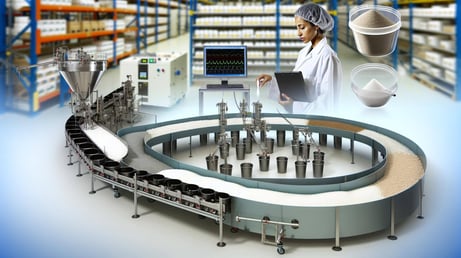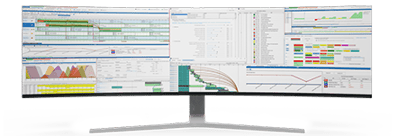Material Flow Optimization in Lean Manufacturing
Plant managers face numerous challenges in ensuring smooth operations, product quality, and cost-effectiveness in pharmaceutical manufacturing. One of the key aspects of achieving these objectives is optimizing material flow within the manufacturing facility.
In this blog, we will look into the intricacies of material flow optimization in lean manufacturing and explore how integrating advanced planning and scheduling software like PlanetTogether with ERP, SCM, and MES systems can drive significant improvements in efficiency, visibility, and agility.

Material Flow Optimization in Lean Manufacturing
Lean manufacturing principles emphasize the elimination of waste and the continuous improvement of processes to achieve optimal efficiency. Material flow optimization is at the heart of lean manufacturing, as it directly impacts several critical factors:
Reduced Lead Times: Streamlined material flow reduces lead times, enabling faster response to market demands and reducing the need for excessive inventory.
Cost Reduction: Efficient material flow minimizes waste, reduces labor costs, and optimizes resource utilization, ultimately leading to cost savings.
Improved Quality: Better material flow control ensures that the right materials are available at the right time and place, enhancing product quality and reducing defects.
Enhanced Visibility: Real-time visibility into material flow helps plant managers make informed decisions and respond quickly to disruptions.
Increased Flexibility: Effective material flow optimization makes manufacturing processes more adaptable to changes in demand or product mix.


Integration for Material Flow Optimization
To achieve these benefits, plant managers can leverage advanced planning and scheduling (APS) solutions like PlanetTogether, integrated with their existing ERP (Enterprise Resource Planning), SCM (Supply Chain Management), and MES (Manufacturing Execution System) systems. Below, we'll explore how such integration can drive material flow optimization in a pharmaceutical manufacturing facility:
Seamless Data Exchange: Integration between PlanetTogether and your ERP system, such as SAP, Oracle, Microsoft, Kinaxis, or Aveva, facilitates the seamless exchange of data. This enables accurate demand forecasting, inventory management, and production planning, all critical for efficient material flow.
Enhanced Visibility: Real-time data synchronization between APS and MES systems provides plant managers with a holistic view of the production process. They can monitor material availability, work-in-progress, and equipment utilization in real time, enabling better decision-making.
Demand-Driven Planning: APS systems like PlanetTogether use demand-driven planning algorithms to align production schedules with actual customer demand. This approach minimizes the risk of overproduction or stockouts, leading to leaner material flow.
Optimized Scheduling: PlanetTogether's advanced scheduling capabilities allow plant managers to optimize the allocation of resources, such as labor and equipment, to maximize production efficiency and minimize bottlenecks.
Predictive Analytics: Integration with MES systems enables predictive analytics for maintenance and quality control, ensuring that equipment breakdowns and defects do not disrupt material flow.
Supplier Collaboration: Integration extends beyond the manufacturing facility. APS systems can facilitate collaboration with suppliers, enabling just-in-time deliveries and reducing inventory carrying costs.
Adaptive Manufacturing: As pharmaceutical manufacturing processes evolve, integrated systems enable agile responses to changes in demand, regulations, or product specifications, ensuring that material flow remains optimized.
Best Practices for Integration Success
To achieve successful integration between PlanetTogether and your ERP, SCM, and MES systems, consider the following best practices:
Define Clear Objectives: Clearly outline your goals for material flow optimization and establish key performance indicators (KPIs) to measure success.
Collaborative Teamwork: Involve cross-functional teams in the integration process, including IT, operations, and supply chain experts.
Data Consistency: Ensure data consistency and quality between systems to avoid discrepancies that could disrupt material flow.
Continuous Improvement: Monitor and analyze KPIs regularly to identify areas for improvement and make necessary adjustments to your processes and systems.
Material flow optimization is a cornerstone of lean manufacturing, and integrating advanced planning and scheduling software like PlanetTogether with ERP, SCM, and MES systems is a powerful strategy for achieving this optimization in pharmaceutical manufacturing facilities. By improving visibility, reducing lead times, and enhancing the quality of products, plant managers can navigate the complexities of modern pharmaceutical production while maintaining cost-effectiveness and agility.
In an industry where precision and efficiency are vital, integration is the key to unlocking the full potential of lean manufacturing principles and ensuring that material flow remains optimized to meet the ever-changing demands of the pharmaceutical market.
Plant managers who embrace these integration strategies will find themselves better equipped to thrive in an increasingly competitive landscape.
Are you ready to take your manufacturing operations to the next level? Contact us today to learn more about how PlanetTogether can help you achieve your goals and drive success in your industry.